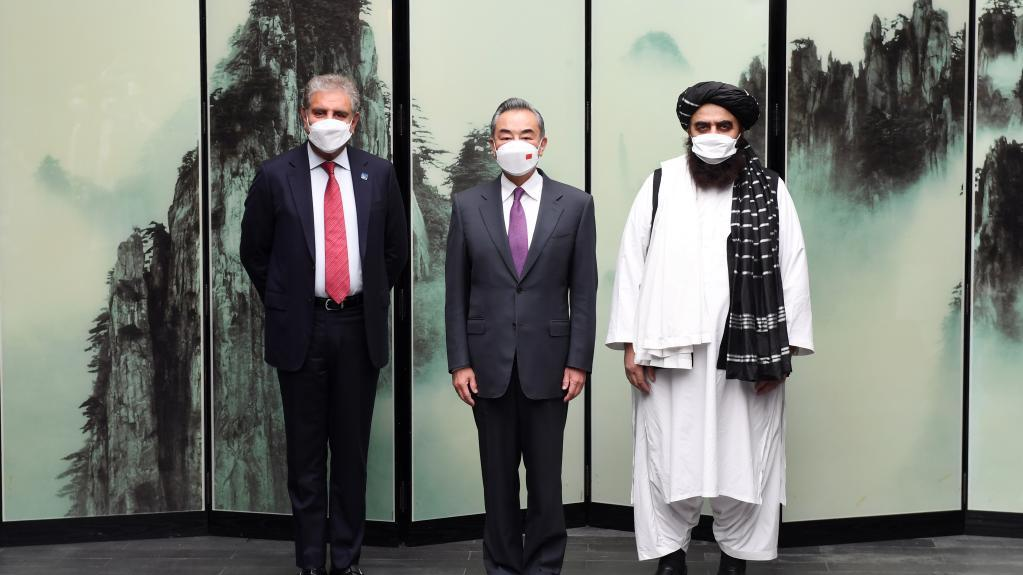
Chinese State Councilor and Foreign Minister Wang Yi presides over the meeting of foreign ministers of China, Afghanistan and Pakistan in Tunxi, east China's Anhui Province, March 30, 2022. [Photo/Xinhua]
By Yuan Sha
As the humanitarian and economic crises unfold in Afghanistan, China hosted key stakeholders in a series of high-level meetings on Afghanistan in Tunxi District, Huangshan City, Anhui Province.
As Chinese President Xi Jinping pointed out in his written remarks to the meeting, "Afghanistan is a common neighbor and partner of all participating countries, and we form a community with a shared future linked by the same mountains and rivers who would rise and fall together," this intensive diplomatic effort would stand as an exemplar of inclusive diplomacy dedicated to the peace and reconstruction of Afghanistan.
First of all, the neighboring countries gathered to play a role in the Afghan peace and reconstruction process. After the U.S. troops' withdrawal last August, the neighboring countries were quick to step in and kick-start the meeting of foreign ministers among the neighboring countries of Afghanistan. The first and second rounds of the meeting were held in Pakistan and Iran in September and October, respectively, last year. China takes up the responsibility and hosts the third round, inviting representatives from Pakistan, Iran, Russia, Tajikistan, Turkmenistan and Uzbekistan to attend, in an effort to devise a workable collective security mechanism. Foreign ministers of Indonesia and Qatar, who have been playing a positive role on the Afghan issue, were also invited as guests.
Second, the Afghan Taliban interim government is represented. China also held a neighboring countries of Afghanistan plus Afghanistan foreign ministers' dialogue, which is an innovative diplomatic endeavor. Acting Foreign Minister Amir Khan Muttaqi of the Taliban interim government was invited to attend the meeting. As the global attention is gripped by the conflict in Ukraine, the worsening humanitarian crisis in Afghanistan has been largely neglected. The Afghan situation is exacerbated by the ongoing global pandemic and economic crisis as well as the latest food and energy crunch. Engaging with Afghan representatives is a necessary step to listen to the urgent needs and concerns of the Afghan people. The prevailing model of "nothing about them without them" used in the negotiation on Ukraine conflict is also needed for a truly Afghan-led and Afghan-owned solution.
Last but not least, an "extended Troika" meeting is to be held as the "China-U.S.-Russia+" consultation mechanism on the Afghan issue. Yue Xiaoyong, special envoy for Afghan affairs of the Chinese Foreign Ministry, presided over the meeting attended by the Russian, U.S. and Pakistani representatives. Pakistan shares the longest border with Afghanistan and is an important stakeholder in this process. China, Russia and the U.S. are three countries which also have stakes and influence in the stability of Afghanistan and the region at large. The U.S. has special responsibility on Afghanistan, since it is the U.S.-led military intervention that started the 20-year war in Afghanistan and then the U.S. strategic pivot to the Indo-Pacific prompted its irresponsible withdrawal and left a war-torn country behind.
While all the stakeholders share the same aspiration in supporting an inclusive Afghan government and reconstruction of the Afghan economy as well as engaging in humanitarian assistance and counter-terrorism cooperation, they also harbor different interests and concerns. Geopolitical tensions are further complicating matters. The U.S.-Russian relation is strained due to the Ukraine crisis. The U.S. is causing push-back by freezing $7 billion of Afghan assets and is also canceling talks with the Taliban in Doha, Qatar.
This meeting thus provides a much-needed opportunity for representatives of different countries to meet and voice respective concerns that need to be fully communicated and addressed. It will be the first time Chinese, Russian and U.S. diplomats meet since the Ukraine crisis. In fact, the meeting between China's State Councilor and Foreign Minister Wang Yi and Russian Foreign Minister Sergey Lavrov also grabbed international attention, where the two sides exchanged views on the ongoing Ukraine conflict and the Chinese side reaffirmed support to Russia-Ukraine peace talks for the goal of building a balanced, effective and sustainable European security architecture.
To be sure, the Afghan issue is important in itself, and it is also consequential to the peace and stability in the region at large. Many suspect the rash U.S. pullout from Afghanistan would leave a void in the country and invite power grabs in the region. By including key stakeholders on the Afghan Dialogue, the inclusive diplomacy would make constructive contributions to the smooth transition of Afghanistan from chaos to order.
The author is an assistant research fellow in the Department of American Studies at the China Institute of International Studies. A former Fulbright scholar at Columbia University, she has a PhD in international politics from China Foreign Affairs University. Yuan has published several papers on China-U.S. security relations in Chinese academic journals and regularly contributes to Chinese media outlets.

 中文
中文





